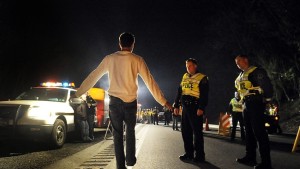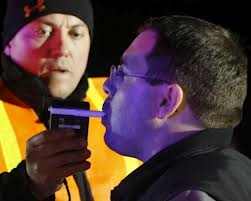You’ve been drinking with your friends at a birthday party celebrating at a local bar and decide to leave the bar at 1:30 in the morning. You started drinking at 9:00 p.m. and had your last drink at 1:15 a.m. As soon as you pull out of the parking lot an officer pulls you over for not having your headlights on. The officer doesn’t see any impaired driving and as soon as you are red lighted you cooperate with all of his directives and show all the appropriate paperwork including drivers license and proof of insurance. He directs you out of your car and you comply with all of his orders including submitting to a few field sobriety tests which you feel you have performed as reasonably as anyone could be expected to perform. You don’t lose your balance, fall over or step off the line. You have a very cooperative attitude and address the officer respectfully.
After completing all of the tests, the officer asks you if you have been drinking and how much. You acknowledge that you have, and tell him that you have consumed four beers, the last of which you drank 10 minutes prior to leaving the bar. At this point, the officer asks you to blow into a breath machine (preliminary alcohol screening device) and you agree to do so. This takes place 15 minutes after you have been stopped. You blow twice with results of .07 and .08. He then arrests you and takes you back to the sub-station and you agree to submit to a blood test approximately 30 minutes after taking the first breath test. Later in the morning, you are released from jail with a citation notifying you of a court date appearance for driving under the influence. At a later date, you find that the blood test was analyzed by the arresting agency’s toxicology department with a result of .09. Subsequently, you are notified in the mail by the district attorney’s office to appear for your arraignment in court coinciding with the date that appears on your citation.
What can be done? Is this case worth fighting? In a word, yes. There are many issues at play in this situation that could help you resolve the case in a favorable manner or even lead to a dismissal. First of all, the officer didn’t see any indicia of impaired driving but appears to have probable cause to pull you over because it was dark and you were driving without headlights on. That is probable cause under the law.
However, because you did not appear to be driving impaired as far as the officer could tell (maybe a little forgetful), and you did well on your field sobriety tests (even acknowledged in the police report), you have a good chance of winning in court on the allegation of driving while impaired which is VC23152(a) driving under the influence of drugs or alcohol or the combined effect.
How about the arrest? Was it legal? Maybe not. The officer is required by law to tell you that you have the option of refusing to blow into the preliminary alcohol screening device or “PAS” device as it is often referred to. As such you have an argument at both the DMV hearing and in court that the subsequent arrest was illegal because protocol was not followed and the only evidence supporting impaired driving was the breath test that wasn’t administered with the proper admonition.
Remember, there was no observed impaired driving and you “passed” your field sobriety test.
How about the blood test resulting in a .09? That test may be an accurate representation of your blood alcohol level at the time you took the test which was 45 minutes after you were last driving. But it is definitely not an accurate representation of your blood alcohol level at the time you were driving. Remember, blood alcohol levels are never static but only rise and fall after peaking. Here, you told the officer that you finished your last drink a few minutes before leaving the bar and as such you were clearly still in the rising mode as it pertains to you alcohol level when pulled over by the officer. Any competent expert would testify in the trial that you were well under the .08 limit at the time you were driving and that is the only number that matters. As such, you have a very good chance of receiving a not guilty verdict at trial and getting a set aside of the DMV suspension at the DMV hearing.
Always consult a DUI attorney before proceeding. You’ll be glad you did.



It’s great to know that you can legally refuse to blow in the test when you get pulled over. My cousin just got a DUI and is facing some jail-time right now. We need to look at bail bonds and find a lawyer that will help his situation.
Thanks for telling me that I need to consult an attorney first before proceeding with the case just in case I get caught for DUI. My friends and I party a lot especially on weekends, so there might be circumstances where I’m forced to drive myself home. It might be a good idea to look for an attorney that I can immediately call just in case it happens to me.